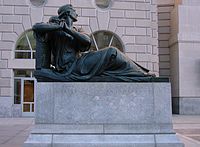Christian worship


In Christianity, worship has been thought as by most Christians to be the central act of Christian identity throughout history. Many Christian theologians have called humanity homo adorans, which means "worshipping man," and so the worship of God is at the very centre of what it means to be human.
History
[change | change source]Overview
[change | change source]Throughout most centuries of Church history, Christian worship has been primarily liturgical, symbolised by prayers and hymns, whose texts were closely related to, the Scripture. Set times for prayer during the day were made (based mostly on Jewish models), and a festal cycle throughout the Church year pointed out the celebration of feasts and holy days relating to the events in the life of Jesus, the lives of the saints, and features of the Church's view of God.
A large amount of importance was placed on the forms of worship, as they were seen in terms of the Latin phrase lex orandi, lex credendi ("the rule of prayer is the rule of belief") — that is, the details of someone's worship show, teach, and govern the principle beliefs of the community. To change the patterns and content of worship were to change the faith itself. So even though there was always a certain amount of variety in the early Church's liturgical worship, there was also a great deal of unity. Each time a heresy appeared in the Church, it normally came by a shift in worship for the heretical group. Orthodoxy in faith also meant orthodoxy in worship, and vice versa.
Early Church Fathers
[change | change source]The very early development of Christian worship is lost in history, but Christian worship is, normally, fixed in the worship of Judaism. The Gospels and the Acts of the Apostles present the very early Christians as visiting both the Temple and synagogues, as well as worshipping in private homes, frequently to "break bread," a term which signifies both the sharing of a meal and, when used in that context, celebrating the Eucharist. Acts 2:42 shows the very early Church of Jerusalem as "continuing in the Apostles' teaching and fellowship [or communion], the breaking of bread, and the prayers."
Contemporary worship
[change | change source]In general, worship for the Eastern churches and for the Catholic and Anglican churches in the West is centered in regular celebration of the Lord's Supper, celebrated by a priest with more or less participation from the whole body of believers that are there. This tradition, variously known as the Mass, Divine Liturgy, Eucharist or Communion, continues in the Anglican church and among some Protestants. A worship service in these traditions is centered on the sharing of bread (or bread and wine) although it also includes prayer, the reading of Scripture, and usually singing and some form of teaching or sermon.
In many Protestant traditions, however, Communion is celebrated rarely or not at all, and corporate worship is centered on a formal sermon, which may resemble a lecture. Worship in such a context also generally is described by spoken prayer, Scripture, and music, mainly hymns.
In virtually all Christian traditions, this regular public worship is accompanied by other forms of worship, such as prayer and study, small group prayer (often linked with Bible study), and formal ceremonies on special occasions, including weddings, funerals and events of Church or state.
Types of Christian worship
[change | change source]Sacraments/Holy Mysteries common to all
[change | change source]Eastern Christianity
[change | change source]Catholicism
[change | change source]Prayer
[change | change source]Psalms
[change | change source]Profession of Faith
[change | change source]Music
[change | change source]Chant
[change | change source]Classical & Baroque
[change | change source]Modern
[change | change source]Holidays and seasons
[change | change source]The most popular religious holidays in the Christian calendar are Christmas, which is after the Advent season, and Easter, which is after Lent and Holy Week. While Christmas is very popular, especially in Western countries, Easter is liturgically by far the most important celebration.


